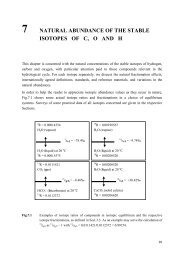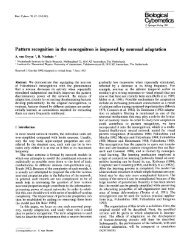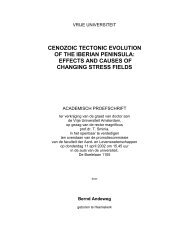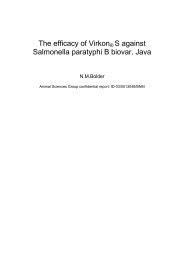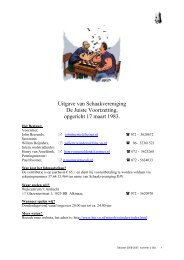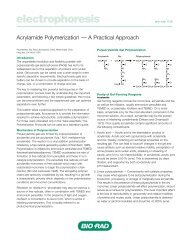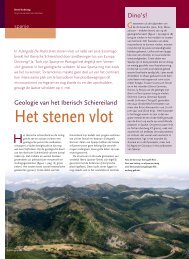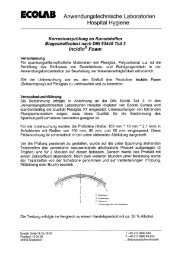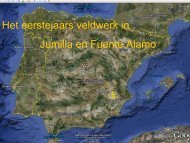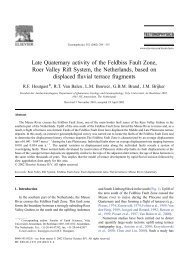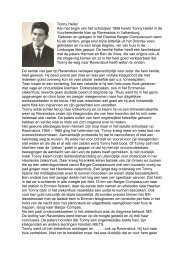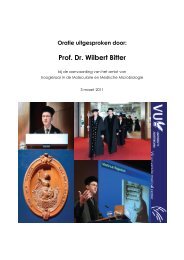with the causal power of exclusive nati<strong>on</strong>alidentity, as is the elect<str<strong>on</strong>g>or</str<strong>on</strong>g>al strength of radicalright parties. These two variables account f<str<strong>on</strong>g>or</str<strong>on</strong>g> anestimated 57% of the country variance illustratedin Figure 2.We have argued that there is no necessaryc<strong>on</strong>necti<strong>on</strong> between nati<strong>on</strong>al identity and supp<str<strong>on</strong>g>or</str<strong>on</strong>g>t<str<strong>on</strong>g>or</str<strong>on</strong>g> oppositi<strong>on</strong> to European integrati<strong>on</strong>. Thedots have to be filled in, and we find that thec<strong>on</strong>necti<strong>on</strong> is str<strong>on</strong>ger when elites, particularlythose leading political parties, are polarized <strong>on</strong> theissue. 13C<strong>on</strong>clusi<strong>on</strong>It is fruitless to seek general validity in eitherec<strong>on</strong>omic <str<strong>on</strong>g>or</str<strong>on</strong>g> identity the<str<strong>on</strong>g>or</str<strong>on</strong>g>ies of preferences. Weneed to inquire into their relative causal power. Inthis article, we do this f<str<strong>on</strong>g>or</str<strong>on</strong>g> a single object: publicopini<strong>on</strong> <strong>on</strong> European integrati<strong>on</strong>. Most scholarshave c<strong>on</strong>ceptualized European integrati<strong>on</strong> as anec<strong>on</strong>omic phenomen<strong>on</strong>, and the bulk of researchhas theref<str<strong>on</strong>g>or</str<strong>on</strong>g>e the<str<strong>on</strong>g>or</str<strong>on</strong>g>ized public opini<strong>on</strong> as afuncti<strong>on</strong> of the distributi<strong>on</strong>al c<strong>on</strong>sequences ofmarket liberalizati<strong>on</strong>. But the European Uni<strong>on</strong>is also a supranati<strong>on</strong>al polity with extensiveauth<str<strong>on</strong>g>or</str<strong>on</strong>g>ity over those living in its territ<str<strong>on</strong>g>or</str<strong>on</strong>g>y. It istheref<str<strong>on</strong>g>or</str<strong>on</strong>g>e plausible to believe that Europeanintegrati<strong>on</strong> engages group, and above all, nati<strong>on</strong>alidentities.Both the<str<strong>on</strong>g>or</str<strong>on</strong>g>ies bite. A multi-level model thatcombines both sources of preference can explainaround a third <str<strong>on</strong>g>or</str<strong>on</strong>g> m<str<strong>on</strong>g>or</str<strong>on</strong>g>e of the variance acrossindividual citizens in the EU, and the bulk ofvariati<strong>on</strong> across countries. However, we findthat identity appears to be the m<str<strong>on</strong>g>or</str<strong>on</strong>g>e powerfulinfluence. To understand how the public viewsEuropean integrati<strong>on</strong>, <strong>on</strong>e needs to c<strong>on</strong>siderhow individuals frame their nati<strong>on</strong>al identity. Docitizens c<strong>on</strong>sider nati<strong>on</strong>al identity as somethingthat can go hand in hand with Europeanintegrati<strong>on</strong>, <str<strong>on</strong>g>or</str<strong>on</strong>g> do they believe that European integrati<strong>on</strong> limits <str<strong>on</strong>g>or</str<strong>on</strong>g>threatens their nati<strong>on</strong>al identity? There is nothing mechanistic <str<strong>on</strong>g>or</str<strong>on</strong>g>inevitable about <strong>on</strong>e <str<strong>on</strong>g>or</str<strong>on</strong>g> the other positi<strong>on</strong>.<str<strong>on</strong>g>Identity</str<strong>on</strong>g> is simple and complex. Citizens can answer thequesti<strong>on</strong> “What is your nati<strong>on</strong>ality” with much greater ease andvalidity than they can tell you f<str<strong>on</strong>g>or</str<strong>on</strong>g> which party <str<strong>on</strong>g>or</str<strong>on</strong>g> candidate theyvoted in the previous electi<strong>on</strong>. Like some in-group/out-groupidentities, nati<strong>on</strong>al identities are f<str<strong>on</strong>g>or</str<strong>on</strong>g>med early in life. Children asyoung as six know full well whether they are British, German, <str<strong>on</strong>g>or</str<strong>on</strong>g>Swedish. Yet the political implicati<strong>on</strong>s of nati<strong>on</strong>al identity emergefrom debate and c<strong>on</strong>flict. Whether a pers<strong>on</strong> is Belgian <str<strong>on</strong>g>or</str<strong>on</strong>g> Britishis (usually) a simple fact, but what does this nati<strong>on</strong>al identityimply f<str<strong>on</strong>g>or</str<strong>on</strong>g> the political choices <strong>on</strong>e makes?To understand the political implicati<strong>on</strong>s of identity <strong>on</strong>etheref<str<strong>on</strong>g>or</str<strong>on</strong>g>e has to probe how identity is c<strong>on</strong>structed and mobilized.Political elites and parties appear to be key. Exclusive nati<strong>on</strong>alidentity is mobilized against European integrati<strong>on</strong> in countrieswhere the elite is polarized <strong>on</strong> European integrati<strong>on</strong>, wherepolitical parties are divided, and where radical right parties arestr<strong>on</strong>g. Data over time would help scholars probe further.In terms of deductive sophisticati<strong>on</strong>, identity the<str<strong>on</strong>g>or</str<strong>on</strong>g>y cannotcompete with ec<strong>on</strong>omic the<str<strong>on</strong>g>or</str<strong>on</strong>g>y—yet. But this is like comparing agasoline engine, h<strong>on</strong>ed over decades, with a hydrogen engine. Ifgroup identities are decisive f<str<strong>on</strong>g>or</str<strong>on</strong>g> preferences over a wide range ofpolitical objects, as recent research suggests, then we can safelypredict that the the<str<strong>on</strong>g>or</str<strong>on</strong>g>ies of group identity will become m<str<strong>on</strong>g>or</str<strong>on</strong>g>esophisticated and m<str<strong>on</strong>g>or</str<strong>on</strong>g>e powerful.4 PS July 2004
Appendix: Variable Descripti<strong>on</strong>sSupp<str<strong>on</strong>g>or</str<strong>on</strong>g>t f<str<strong>on</strong>g>or</str<strong>on</strong>g>EuropeanIntegrati<strong>on</strong>Educati<strong>on</strong>Professi<strong>on</strong>al/Manager*Gross Nati<strong>on</strong>alIncomeManual W<str<strong>on</strong>g>or</str<strong>on</strong>g>ker*Gross Nati<strong>on</strong>alIncomePers<strong>on</strong>al<str<strong>on</strong>g>Ec<strong>on</strong>omic</str<strong>on</strong>g>ProspectsNati<strong>on</strong>al<str<strong>on</strong>g>Ec<strong>on</strong>omic</str<strong>on</strong>g>PerspectivesFiscalTransferType ofCapitalismNati<strong>on</strong>alAttachmentExclusiveNati<strong>on</strong>al<str<strong>on</strong>g>Identity</str<strong>on</strong>g>MulticulturalismAn index of three items: (1) Principle of membership – “Generallyspeaking, do you think that [our country’s] membership of theEuropean Uni<strong>on</strong> is (a bad thing, neither good n<str<strong>on</strong>g>or</str<strong>on</strong>g> bad, a goodthing)?” (2) Desired speed – (1=integrati<strong>on</strong> should be broughtto a “standstill”; 7= integrati<strong>on</strong> should run “as fast as possible”),and (3) Desired directi<strong>on</strong> – “In five years’ time, would you likethe European Uni<strong>on</strong> to play (a less imp<str<strong>on</strong>g>or</str<strong>on</strong>g>tant role, same role, am<str<strong>on</strong>g>or</str<strong>on</strong>g>e imp<str<strong>on</strong>g>or</str<strong>on</strong>g>tant role) in your daily life?” The c<str<strong>on</strong>g>or</str<strong>on</strong>g>relati<strong>on</strong> is 0.409between (1) and (2), 0.448 between (1) and (3), and 0.473between (2) and (3). Standardized item = 0.706. The indexis recoded as a 0-100 thermometer scale, with higher sc<str<strong>on</strong>g>or</str<strong>on</strong>g>esindicating greater supp<str<strong>on</strong>g>or</str<strong>on</strong>g>t.Measured by the age of resp<strong>on</strong>dents when they stopped full-timeeducati<strong>on</strong> (D.8) and recoded <strong>on</strong> a 4-point scale.Interacti<strong>on</strong> term of (1) a dichotomous variable Professi<strong>on</strong>al Managerthat takes a value of 1 when resp<strong>on</strong>dent is professi<strong>on</strong>al (selfemployed<str<strong>on</strong>g>or</str<strong>on</strong>g> employed), general manager, <str<strong>on</strong>g>or</str<strong>on</strong>g> business propriet<str<strong>on</strong>g>or</str<strong>on</strong>g>(D.15), and (2) gross nati<strong>on</strong>al income per capita f<str<strong>on</strong>g>or</str<strong>on</strong>g> resp<strong>on</strong>dent’scountry of residence (in US dollars at exchange rate prices f<str<strong>on</strong>g>or</str<strong>on</strong>g>2001, divided by 1000). Values range from zero to 30.6 f<str<strong>on</strong>g>or</str<strong>on</strong>g>Denmark. Source: W<str<strong>on</strong>g>or</str<strong>on</strong>g>ld Development Indicat<str<strong>on</strong>g>or</str<strong>on</strong>g>s Database(W<str<strong>on</strong>g>or</str<strong>on</strong>g>ldbank, April 2003.)Interacti<strong>on</strong> term of (1) a dichotomous variable Manual W<str<strong>on</strong>g>or</str<strong>on</strong>g>kerthat takes a value of 1 when resp<strong>on</strong>dent is skilled <str<strong>on</strong>g>or</str<strong>on</strong>g> unskilledmanual w<str<strong>on</strong>g>or</str<strong>on</strong>g>ker, <str<strong>on</strong>g>or</str<strong>on</strong>g> n<strong>on</strong>-desk employee (e.g., salesman, driver)(D.15), and (2) gross nati<strong>on</strong>al income per capita f<str<strong>on</strong>g>or</str<strong>on</strong>g> resp<strong>on</strong>dent’scountry of residence (in US dollars at exchange rate prices f<str<strong>on</strong>g>or</str<strong>on</strong>g>2001). Values range from 0 to 30.6 f<str<strong>on</strong>g>or</str<strong>on</strong>g> Denmark. Source: W<str<strong>on</strong>g>or</str<strong>on</strong>g>ldDevelopment Indicat<str<strong>on</strong>g>or</str<strong>on</strong>g>s Database (W<str<strong>on</strong>g>or</str<strong>on</strong>g>ldbank, April 2003.)An index of three items measuring resp<strong>on</strong>dents’ expectati<strong>on</strong>s(w<str<strong>on</strong>g>or</str<strong>on</strong>g>se, same, better) c<strong>on</strong>cerning their future life, the financial situati<strong>on</strong>in their household, and their job situati<strong>on</strong> (Q.501, Q503,Q505). Standardized item = 0.763. Values range from 1 to 3.An index of two items measuring resp<strong>on</strong>dents’ expectati<strong>on</strong>s(w<str<strong>on</strong>g>or</str<strong>on</strong>g>se, same, better) c<strong>on</strong>cerning the ec<strong>on</strong>omic situati<strong>on</strong> and theemployment situati<strong>on</strong> in their country (Q.502, Q504.) Valuesrange from 1 to 3.Net fiscal transfers per country as percentage of GDP as an annualaverage over the period of 1995-2000. Values range from-0.56 f<str<strong>on</strong>g>or</str<strong>on</strong>g> Germany to 3.88 f<str<strong>on</strong>g>or</str<strong>on</strong>g> Greece. Source: Commissi<strong>on</strong> ofthe European Uni<strong>on</strong> (2001.)Categ<str<strong>on</strong>g>or</str<strong>on</strong>g>izati<strong>on</strong> based <strong>on</strong> type of nati<strong>on</strong>al producti<strong>on</strong> system(liberal market vs. mixed vs. co<str<strong>on</strong>g>or</str<strong>on</strong>g>dinated) and extent of welfareredistributi<strong>on</strong> (limited, medium, extensive—measured by Giniindex). Country sc<str<strong>on</strong>g>or</str<strong>on</strong>g>es reflect distance from the median (mixedsystem, medium redistributi<strong>on</strong>) whereby the median categ<str<strong>on</strong>g>or</str<strong>on</strong>g>y is2, adjacent cells are 1, and two cells removed are 0. Source:Gourevitch and Hawes (2001.)Questi<strong>on</strong> Q. 803: “People may feel different degrees of attachmentto their town <str<strong>on</strong>g>or</str<strong>on</strong>g> village, to their regi<strong>on</strong>, to their country, <str<strong>on</strong>g>or</str<strong>on</strong>g>to Europe. Please tell me how attached you feel to … (3) [ourcountry]: very attached, fairly attached, not very attached, not atall attached, d<strong>on</strong>’t know.” This is a 4-point scale.A dichotomous variable that takes the value of 1 f<str<strong>on</strong>g>or</str<strong>on</strong>g> resp<strong>on</strong>dentswith exclusive nati<strong>on</strong>al identity ([nati<strong>on</strong>ality] <strong>on</strong>ly). Recoded from:“In the near future, do you see yourself as (1) [nati<strong>on</strong>ality] <strong>on</strong>ly,(2) [nati<strong>on</strong>ality] and European, (3) European and [nati<strong>on</strong>ality], <str<strong>on</strong>g>or</str<strong>on</strong>g>(4) European <strong>on</strong>ly?” (Q.23.)“Thinking about the enlargement of the European Uni<strong>on</strong> toinclude new countries, do you tend to agree <str<strong>on</strong>g>or</str<strong>on</strong>g> tend to disagreewith the following statement …’With m<str<strong>on</strong>g>or</str<strong>on</strong>g>e member countries,Europe will be culturally richer’ (tend to disagree, d<strong>on</strong>’t know,tend to agree).’” (Q.399.) This is a 3-point scale.Note: Q and D notati<strong>on</strong>s refer to questi<strong>on</strong>s in the Eurobarometer codebook (Hartung2002).ReferencesAnders<strong>on</strong>, Christopher J. 1998. “When in Doubt, Use Proxies:Attitudes Toward Domestic Politics and Supp<str<strong>on</strong>g>or</str<strong>on</strong>g>t f<str<strong>on</strong>g>or</str<strong>on</strong>g>European Integrati<strong>on</strong>.” Comparative Political Studies31: 569–601.Brinegar, Adam, Seth Jolly, and Herbert Kitschelt. 2004.“Varieties of Capitalism and Political Divides over EuropeanIntegrati<strong>on</strong>.” In European Integrati<strong>on</strong> and PoliticalC<strong>on</strong>fl ict, eds. Gary Marks and Marco Steenbergen.Cambridge: Cambridge University Press, 62–89.Carey, Sean. 2002. “Undivided Loyalties: Is Nati<strong>on</strong>al <str<strong>on</strong>g>Identity</str<strong>on</strong>g>an Obstacle to European Integrati<strong>on</strong>?” EuropeanUni<strong>on</strong> Politics 3: 387–413.Carrubba, Cliff<str<strong>on</strong>g>or</str<strong>on</strong>g>d J. 2001. “The Elect<str<strong>on</strong>g>or</str<strong>on</strong>g>al C<strong>on</strong>necti<strong>on</strong>in European Uni<strong>on</strong> Politics.” Journal of Politics 63:141–58.Citrin, Jack, and John Sides. F<str<strong>on</strong>g>or</str<strong>on</strong>g>thcoming. “Can There beEurope without Europeans? Problems of <str<strong>on</strong>g>Identity</str<strong>on</strong>g> in aMultinati<strong>on</strong>al Community.” In Identities in Europe andthe Instituti<strong>on</strong>s of the European Uni<strong>on</strong>, eds. RichardHerrmann, Marilynn Brewer, and Thomas Risse. Lanham,MD.: Rowman and Littlefield.Citrin, Jack, Beth Reingold, and D<strong>on</strong>ald P. Green. 1990.“American <str<strong>on</strong>g>Identity</str<strong>on</strong>g> and the Politics of Ethnic Change.”Journal of Politics 52: 1124–54.Commissi<strong>on</strong> of the European Uni<strong>on</strong>. 2001. Allocati<strong>on</strong> of2000 EU Operating Expenditure by Member State. EuropeanCommissi<strong>on</strong>, Budget Direct<str<strong>on</strong>g>or</str<strong>on</strong>g>ate, September 2001.Christin, Thomas, and Alexander Trechsel. 2002. “Joiningthe EU? Explaining <str<strong>on</strong>g>Public</str<strong>on</strong>g> <str<strong>on</strong>g>Opini<strong>on</strong></str<strong>on</strong>g> in Switzerland.”European Uni<strong>on</strong> Politics 3: 415–43.Deutsch, Karl W. 1957. Nati<strong>on</strong>alism and Social Communicati<strong>on</strong>.New Y<str<strong>on</strong>g>or</str<strong>on</strong>g>k: John Wiley.Diez Medrano, Juan. 2003. Framing Europe: Attitudes toEuropean Integrati<strong>on</strong> in Germany, Spain, and the UnitedKingdom. Princet<strong>on</strong>: Princet<strong>on</strong> University Press.Druckman, Daniel. 1994. “Nati<strong>on</strong>alism, Patriotism, andGroup Loyalty: A Social Psychological Perspective.”Mersh<strong>on</strong> Internati<strong>on</strong>al Studies Review 38: 43–68.Eichenberg, Richard, and Russell Dalt<strong>on</strong>. 1993. “Europeansand the European Community: The Dynamics of <str<strong>on</strong>g>Public</str<strong>on</strong>g>Supp<str<strong>on</strong>g>or</str<strong>on</strong>g>t f<str<strong>on</strong>g>or</str<strong>on</strong>g> European Integrati<strong>on</strong>.” Internati<strong>on</strong>al Organizati<strong>on</strong>47: 507–34.Elster, J<strong>on</strong>. 1990. “When <str<strong>on</strong>g>Rati<strong>on</strong>ality</str<strong>on</strong>g> Fails.” In The Limitsof <str<strong>on</strong>g>Rati<strong>on</strong>ality</str<strong>on</strong>g>, eds. Karen Schweers Cook and MargaretLevi. Chicago: University of Chicago Press, 19–51.Gabel, Matthew. 1998. Interests and Integrati<strong>on</strong>: MarketLiberalizati<strong>on</strong>, <str<strong>on</strong>g>Public</str<strong>on</strong>g> <str<strong>on</strong>g>Opini<strong>on</strong></str<strong>on</strong>g>, and European Uni<strong>on</strong>.Ann Arb<str<strong>on</strong>g>or</str<strong>on</strong>g>: University of Michigan Press.Gourevitch, Peter, and Michael Hawes. 2001. “UnderstandingNati<strong>on</strong>al Producti<strong>on</strong> Systems: Comparative Capitalismin the Globalized Ec<strong>on</strong>omy.” Paper presented at theAPSA Annual Meeting, San Francisco.Haas, Ernst. 1958. The Uniting of Europe. Stanf<str<strong>on</strong>g>or</str<strong>on</strong>g>d: Stanf<str<strong>on</strong>g>or</str<strong>on</strong>g>dUniversity Press.Haesly, Richard. 2001. “Euroskeptics, Europhiles andInstrumental Europeans : European Attachment in Scotlandand Wales.” European Uni<strong>on</strong> Politics 2: 81–102.Hall, Peter A., and David Soskice, eds. 2001. Varieties ofCapitalism: The Instituti<strong>on</strong>al Foundati<strong>on</strong>s of ComparativeAdvantage. Oxf<str<strong>on</strong>g>or</str<strong>on</strong>g>d: Oxf<str<strong>on</strong>g>or</str<strong>on</strong>g>d University Press.Hartung, Harald. 2002. Eurobarometer 54.1: BuildingEurope and the European Uni<strong>on</strong>: The European Parliament,<str<strong>on</strong>g>Public</str<strong>on</strong>g> Safety, and Defense Policy, November-December2000. Brussels: Commissi<strong>on</strong> of the EuropeanCommunity.Hermann, Richard, Marilynn Brewer, and Thomas Risse,eds. F<str<strong>on</strong>g>or</str<strong>on</strong>g>thcoming. Identities in Europe and the Instituti<strong>on</strong>sof the European Uni<strong>on</strong>. Lanham, MD.: Rowmanand Littlefield.Hjerm, Mikael. 1998. “Nati<strong>on</strong>al Identities, Nati<strong>on</strong>al Prideand Xenophobia: A Comparis<strong>on</strong> of Four Western Countries.”Acta Sociologica 41: 335–47.Hooghe, Liesbet, Gary Marks, and Carole Wils<strong>on</strong>. 2002.“<str<strong>on</strong>g>Does</str<strong>on</strong>g> Left/Right Structure Party Positi<strong>on</strong>s <strong>on</strong> EuropeanIntegrati<strong>on</strong>?” Comparative Political Studies 35: 965–89.PSOnline www.apsanet.<str<strong>on</strong>g>or</str<strong>on</strong>g>g 5



